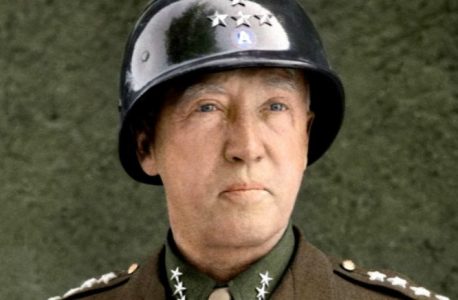By Douglas Mercer for National Vanguard
FOR GERMANY in 1945 international terror blew in from the East and it blew in from the West. No one who then saw the grim visage of the Beast would ever again be mollified by the platitudes of the years ahead: liberty, equality, democracy, the brotherhood of man, human rights.
Revilo Oliver said that when he came to Washington DC in 1945 he was fully confident that the American people would soon purge the traitors from the government, root and branch; sure that when they found out about the Jewish treachery that had led them to war they would exact their just retribution.
Eight years later, with the fall of Joe McCarthy, Oliver admitted to himself that his earlier confidence had been entirely misplaced, and he had been terribly wrong.
Prior to the Second World War and through most of its fighting, George Patton had been a mostly apolitical person. He had one love, one interest, one avocation: war.
When war did break out he did not see it as a way to defeat “evil Nazis,” or liberate the Jews, or strike a blow for liberty. He saw it as a way to again become involved in the only thing which mattered to him, the thing that obsessed him: war.
What woke Patton up from his apolitical slumber was when he slapped a soldier who was shirking duty. Soon the press was portraying him as a vicious and tyrannical ogre. It did not take him long to see the power of the media to shape events, nor did it take him long to identify the media as Jewish-run.
Patton despised Eisenhower as a pencil-pusher and a sycophant. And when Eisenhower stopped Patton from beating the Red Army to Berlin he more than despised him. He began to see that some conspiracy was afoot. A conspiracy which was very content to consign millions to the ruthless terror of the Soviets. A war for human freedom, indeed.
When he finally did make it to an already pacified Berlin his education became complete. He saw for the first time that this had not been a war game, or a valiant patriotic cause. This had been international terror.
The first clue to Patton’s mindset is his reaction to the Jews he saw. For most today, accustomed to 75 years of relentless propaganda and indoctrination, the sight of emaciated Jews after the war elicits enormous, unlimited compassion. Here is the ultimate victim, they think, the most pressing symbol of man’s inhumanity to man.
Patton, who saw them in the flesh, had an entirely different reaction. The sight of the “displaced” Jews filled him with disgust, repelled him to his core. He considered them subhuman, and was opposed to the care and attention being lavished on them.
His view of the Red Army was also negative. He called them barbarians and noted that they staggered drunk around the city.
On the other hand he viewed the German people with enormous sympathy and was impressed by them. He said if you summon ten Germans and tell them to dig a hole, when you come back in an hour or two you’d have your hole.
This was a people he could do business with. This was a noble people, a people worth saving.
He saw right away that we had fought the wrong army.
He understood what Grand Admiral Doenitz, the successor to Adolf Hitler as Germany’s head of state, had said prior to the surrender of the Third Reich. He saw that the British and the Americans do not fight for the interests of their own peoples, but for the spreading of Bolshevism.
Patton had belatedly realized that he and his men had not been the vanguard of human liberation, but had been used as a blunt instrument in furtherance of an international criminal conspiracy: a conspiracy of Jews, of Jews in high places in the American government.
This knowledge, of course, ran counter to the emerging narrative being spun by the victors; ran counter to the propaganda that the Jews were history’s only victim (instead of what they really were, the perpetrators of a great crime). In short, this knowledge was dynamite. This was knowledge that the American people needed to get but which, with rare exceptions, they never did.
Patton immediately wanted to assemble an army, comprised of American and German troops, with him at its head. An army to drive the Reds out of Europe and back to the outskirts of Moscow. A war of real liberation.
When they got wind of this plan, the military higher-ups looked at Patton like he had three eyes.
But really it was only he who was seeing clearly. It was only he who was not in the thrall of a dangerous and treacherous enemy.
When Patton heard of the plans to try the German leadership for war crimes at Nuremberg, he was livid. This went against every value he held. He did not see the Germans as evil in any way, but rather as the honored enemy he had just defeated. To try them in a farce of a quasi-judicial trial on fabricated charges — and for “crimes” which hadn’t even existed in any statute or law, anywhere, just months before — would be a sordid and dishonorable exercise; to try them would be to sully the war that had just been fought. It went completely against the ancient warrior code of which he was the foremost exponent.
It offended his Saxon sense of fair play.
It was meant to.
He had already gone on record against the efforts at “denazification”; he saw no reason to purge this already great people of their best men. He knew in the battle ahead such men would be needed.
Had he lived to learn of the Morgenthau Plan to subjugate and de-industrialize Germany, to keep the German people on their knees, it would have confirmed what he already knew: that Jews were running the American government, running it for their own nefarious purposes.
Washington DC had passed outside of American control.
George Patton had enormous prestige, tremendous courage, endless charisma, and a mouth that was unstoppable,
Had the fireball of anger and “fight” that was George Patton rolled into America, armed with his newly won knowledge, it would have been explosive.
Later he would have learned what McCarthy learned: the facts and details proving that the Roosevelt administration was riddled with Jewish communists; the facts showing that Americans had been betrayed by the people in whom they had put their trust.
He was the one man who could have made these charges stick. He was the one man who could have saved the American people from the brainwashing that began in earnest and then ramped up before, during, and after the war — brainwashing that portrayed Hitler and National Socialist Germany as a singular evil that must be destroyed and banished, whatever the cost — brainwashing that portrayed the grim visage of the Beast as the “hope of humanity.”
George Patton could have set the record straight, to the incalculable advantage of the American people.
As such, the leaders of our corrupted government and military knew he was a danger to them: He was liable to take the whole thing down.
As such, they knew that he had to be disposed of. And so they murdered him.
And so the man who could have righted history and set America on an honorable course, this great man, this American hero, this man to whom all honors go, this man never made it out alive.

